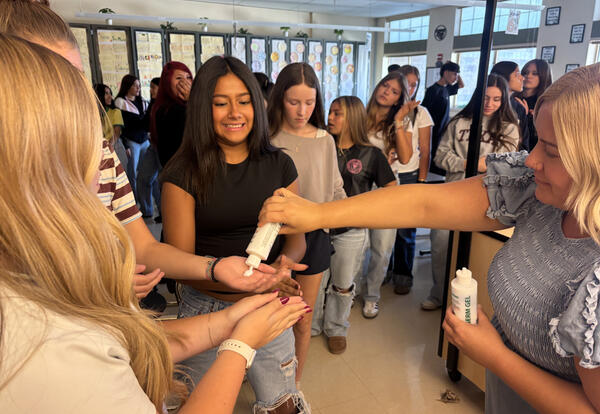
Eastmont Junior High teacher Joni Rodriguez kicks off the course Nutrition & Wellness with a simple but essential lesson: wash your hands before cooking. Students scrubbed up, then checked under a blacklight to find the spots they missed. The result? A few laughs, a lot of “ewws,” and a lesson that stuck.
Whatever happened to “Home Ec”? Many adults look back and wonder if today’s students are still learning those practical life skills: cooking, cleaning, budgeting, and more. At Eastmont Junior High, the answer is a definite yes. Today’s Nutrition and Wellness course teaches much more than recipes: it covers food safety, cooking techniques, nutrition, budgeting, and other life-ready skills. Led by teacher Joni Rodriguez, the class gives students hands-on experience in a classroom full of ovens, sinks, and microwaves, along with real-life conversations about the knowledge they’ll carry into adulthood.
The course also connects directly to graduation requirements and community needs. Nutrition and Wellness is open to all ninth graders, whether taken for Career and Technical Education (CTE) credit or as an elective, and it remains available to Sterling Junior High students and at Eastmont High School. Rodriguez emphasizes that these opportunities make the course more than just an elective. “Family and Consumer Science classes are an investment in our students’ education because they teach them the skills they need to be ready to enter the workforce as productive members of the community,” she said. She added “the FCS program is not a cost, but a critical investment in the future well-being of every Eastmont student and the stability of our workforce.”
Far from the stereotypical “sewing and cooking” class of the past, today’s program integrates science, technology, and global awareness. Students use digital tools like nutrition tracking apps, explore the science behind fad diets, and consider the impact of media on food choices. The curriculum also emphasizes sustainability, from reducing food waste to understanding global supply chains. For some students, the class even connects to career pathways in culinary arts, food science, or healthcare and dietetics. Looking ahead, Rodriguez expects the program to continue growing with an emphasis on health equity, real-world economics, and innovations in food technology and safety.
What once was “Home Ec” has evolved into a modern, relevant program that prepares students for life and work in a changing world. It shows how Eastmont’s teachers honor tradition while giving students the skills they need today.
Want to get more news like this one? Go directly to the Join Community Groups sign-up page. View all Eastmont News.
